Humane Law Enforcement
About Dogs & Dog Laws
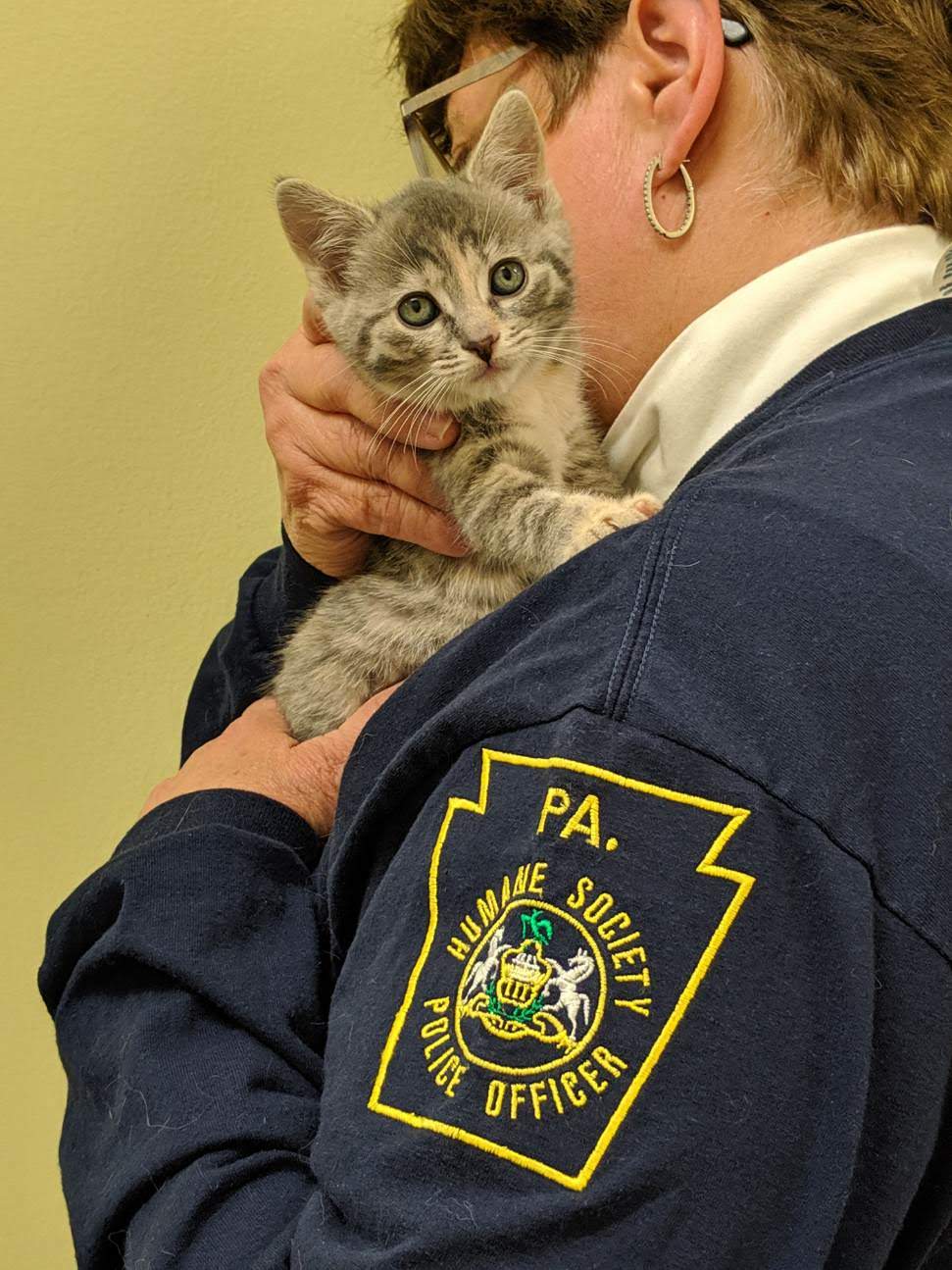 Owning a dog is one of the great American pastimes and privileges. Dogs fill the role of companion, guide, hunter, guardian, herdsman, and entertainer. But owning a dog is a major responsibility. That responsibility extends not only to proper care and training of your dog but also to your responsibility for the dog's behavior. A proper understanding of the obligations of dog ownership and Pennsylvania Dog Laws is necessary for today's complex society.
Owning a dog is one of the great American pastimes and privileges. Dogs fill the role of companion, guide, hunter, guardian, herdsman, and entertainer. But owning a dog is a major responsibility. That responsibility extends not only to proper care and training of your dog but also to your responsibility for the dog's behavior. A proper understanding of the obligations of dog ownership and Pennsylvania Dog Laws is necessary for today's complex society.
What are Pennsylvania's Dog Laws?
- All dogs three months of age or older must be licensed.
- All dogs must be under control and may not be allowed to run at large. Dogs are personal property and owners are responsible for damages caused by their dog.
- It is illegal to mistreat or abuse any animal. Violations should be reported to the local humane organization or police.
- You may not place any poison or harmful substance in any place where it may be easily found and eaten by dogs whether it be your property or elsewhere.
- It is illegal to abandon or attempt to abandon any dog. Fines for abandonment range from $300 to $1,000 plus court costs.
- No dog under seven weeks old may be bartered, traded, sold, or transferred.
- You must have a current kennel license if you operate a kennel that keeps, harbors, boards, shelters, sells, gives away or transfers a total of 26 or more dogs in any one calendar year.
- It is illegal to interfere with an officer or employee of the Pennsylvania Department of Agriculture engaged in the enforcement of the Dog Laws.
- Dog Tethering is against the law. Click here for more information.
Written Notice for Dog Purchases – PA Laws on Buying Dogs
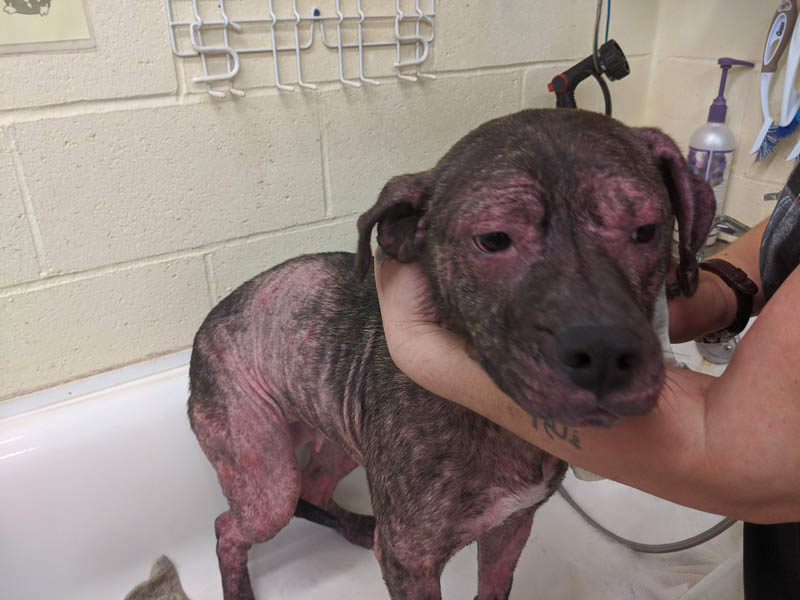 This disclosure of rights is a summary of Pennsylvania law as published in the Western Pennsylvania Kennel Association's show catalog for Friday, April 2, and Saturday, April 3, 1999. The actual provisions of the law are in Section 9.3 of the Unfair Trade Practices and Consumer Protection Law.
This disclosure of rights is a summary of Pennsylvania law as published in the Western Pennsylvania Kennel Association's show catalog for Friday, April 2, and Saturday, April 3, 1999. The actual provisions of the law are in Section 9.3 of the Unfair Trade Practices and Consumer Protection Law.
This section is enforced by the Bureau of Consumer Protection in the Office of Attorney General, Mike Fisher (in 1999). A civil penalty of up to $1,000 shall be levied for each violation in addition to any other penalty under this act.
A seller shall provide you with a health record for the dog at the time of sale. The health record shall include the dog's breed, date of birth, sex, color and markings, vaccinations and who administered them, any parasitical medicine administered to the dog with the date, dosage and type stated, and a statement by the seller that all the information provided is true with the name, address, and signature of the seller.
The seller shall provide a health certificate issued by a veterinarian within 21 days prior to the date of sale OR a guarantee of good health issued and signed by the seller. The health certificate shall certify the dog is free from illness and defects and does not appear clinically ill from parasitic infestations. The health certificate shall include the name, address, signature of the veterinarian, and date of examination. The guarantee of good health is issued by the seller, dated and signed by the seller and you. The guarantee of good health shall state the dog is free of disease, defects and does not appear to be clinically ill from parasitic infestation.
If the dog dies or is determined by a veterinarian to have a contagious, infectious, parasitic illness or becomes clinically ill within 10 days, you may exercise one of the following options: (1) Return the dog for a complete refund; (2) Return the dog for a replacement dog of equal value; OR (3) Retain the dog and receive reimbursement for reasonable veterinary fees, not exceeding the purchase price.
If the dog has or dies from a congenital or hereditary defect or is certified through a physical examination to have a defect which adversely affects the animal within 30 days, you may exercise one of the following options: (1) Return the dog for a complete refund; (2) Return the dog for a replacement dog of equal value; OR (3) Retain the dog and receive reimbursement for reasonable veterinary fees, not exceeding the purchase price.
Failure to notify the seller of the condition within two business days of receiving the veterinarian's certification of illness will result in forfeiture of rights unless a health certificate issued by a veterinarian was provided by the seller and it disclosed that health problem.
Refunds or reimbursements shall be made no later than 14 days after the seller receives the veterinarian certification. Veterinarian certification shall be presented to the seller not later than 5 days after you receive it.
Registerable Dogs: If the seller does not provide within 120 days all documentation to effect registration, you may exercise one of the following options: (1) Return the dog and receive a full refund of the purchase price; OR (2) Retain the dog and receive a 50% refund of the purchase price.
If registerable, the seller shall provide at the time of sale: the breeder's name and address, the name and registration number of the dam and sire, and the name and address of the pedigree registry organization where the dam and sire are registered.
Attorney General, Jerry Pappert, Consumer Protection Hotline 1-800-441-2555 or www.attorneygeneral.gov.
Pennsylvania Cruelty Laws
The following are not recommendations, THEY ARE PENNSYLVANIA LAW!
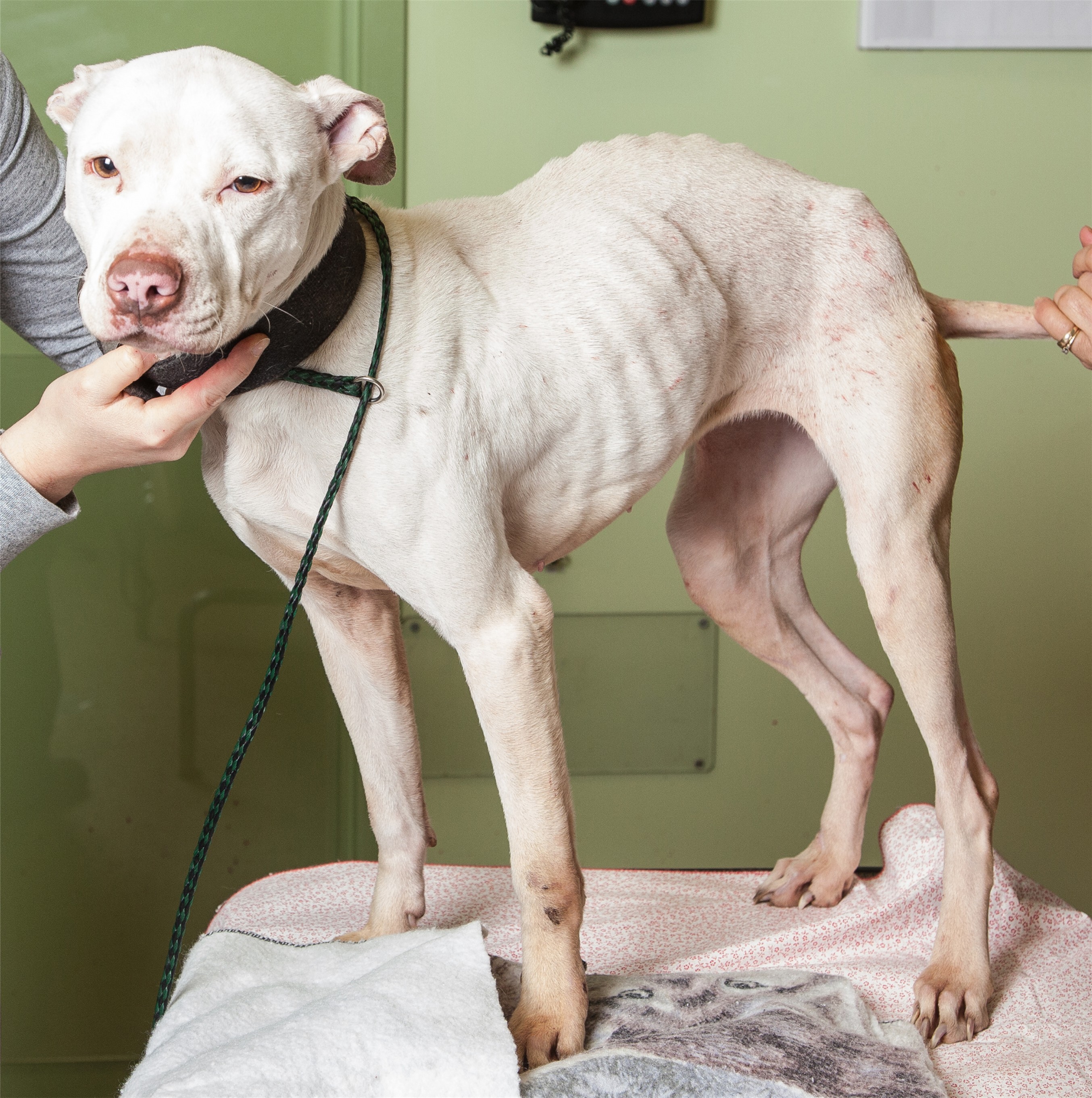 5532. Neglect of animal
5532. Neglect of animal
(a) Offense defined - A person commits an offense if the person fails to provide any of the following for each animal to which the person has a duty of care, whether belonging to himself or otherwise:
(1) Necessary sustenance and potable water
(2) Access to clean and sanitary shelter and protection from the weather. The shelter must be sufficient to permit the animal to retain body heat and keep the animal dry.
(3) Necessary veterinary care.
(b) Grading
(1) Except as set forth in paragraph (2), a violation of this section is a summary offense.
(2) If the violation causes bodily injury to the animal or places the animal at imminent risk of serious bodily injury, a violation of this section is a misdemeanor of the third degree.
5533. Cruelty to animal
(a) Offense defined - A person commits an offense if the person intentionally, knowingly or recklessly ill-treats, overloads, beats, abandons or abuses an animal.
(b) Grading
(1) Except as set forth in paragraph (2), a violation of this section is a summary offense.
(2) If the violation causes bodily injury to the animal or places the animal at imminent risk of serious bodily injury, a violation of this section is a misdemeanor of the second degree.
5534. Aggravated cruelty to animal
(a) Offense defined - A person commits an offense if the person intentionally or knowingly does any of the following:
(1) Tortures an animal.
(2) Violates section 5532 (relating to neglect of animal) or 5533 (relating to cruelty to animal) causing serious bodily injury to the animal or the death of the animal.
(b) Grading - A violation of this section is a felony of the third degree.
5536. Tethering of unattended dog
(a) Presumptions
(1) Tethering an unattended dog out of doors for less than 9 hours within a 24 hour period when all of the following conditions are present shall create a rebuttable presumption that a dog has not been the subject of neglect within the meaning of section 5532 (relating to neglect of animal):
(i) The tether is of a type commonly used for the size and breed of dog and is at least three times the length of the dog as measured from the tip of its nose to the base of its tail or 10 feet, whichever is longer.
(ii) The tether is secured to a well-fitted collar or harness by means of a swivel anchor, swivel latch or other mechanism designed to prevent the dog from becoming entangled.
(iii) The tethered dog has access to potable water and an area of shade that permits the dog to escape the direct rays of the sun.
(iv) The dog has not been tethered for longer than 30 minutes in temperatures above 90 or below 32 degrees Fahrenheit.
(2) The presence of any of the following conditions regarding tethering an unattended dog out of doors shall create a rebuttable presumption that a dog has been the subject of neglect within the meaning of section 5532:
(i) Excessive waste or excrement in the area where the dog is tethered.
(ii) Open sores or wounds on the dog's body.
(iii) The use of a tow or log chain, or a choke, pinch, prong or chain collar.
(b) Construction - This section shall not be construed to prohibit any of the following:
(1) Tethering a dog while actively engaged in lawful hunting, exhibition, performance events or field training.
(2) Tethering a hunting, sporting or sledding dog breed where tethering is integral to the training, conditioning or purpose of the dog.
(3) Tethering a dog in compliance with the requirements of a camping or recreational area.
(4) Tethering a dog for a period of time, not to exceed one hour, reasonably necessary for the dog or person to complete a temporary task.
Animal Fighting is Illegal & a FELONY!
If you suspect animal fighting, contact our office immediately!
5543. Animal fighting
A person commits a felony of the third degree if the person:
(1) for amusement or gain, causes, allows or permits an animal to engage in animal fighting
(2) receives compensation for the admission of another person to a place kept or used for animal fighting
(3) owns, possesses, keeps, trains, promotes, purchases, steals or acquires in any manner or knowingly sells an animal for animal fighting
(4) in any way knowingly encourages, aids or assists therein
(5) wagers on the outcome of an animal fight
(6) pays for admission to an animal fight or attends an animal fight as a spectator
(7) knowingly permits a place under the person's control or possession to be kept or used for animal fighting
5544. Possession of animal fighting paraphernalia
In addition to any other penalty provided by law, a person commits a misdemeanor of the third degree if the person knowingly owns or possesses animal fighting paraphernalia
5550. Fine and term of imprisonment for summary offense
Unless otherwise specifically provided, a person convicted of a summary offense under this subchapter shall, upon conviction, be sentenced to pay a fine of not less than $50 nor more than $750 or imprisonment for not more than 90 days, or both.
5551. Power to initiate criminal proceedings
An agent of a society or association for the prevention of cruelty to animals, incorporated under the laws of this Commonwealth, shall have the same powers to initiate criminal proceedings provided for police officers by the Pennsylvania Rules of Criminal Procedure. An agent of a society or association for the prevention of cruelty to animals, incorporated under the laws of this Commonwealth, shall have standing to request a court of competent jurisdiction to enjoin a violation of this subchapter.
5556. Civil immunity for licensed doctors of veterinary medicine, technicians and assistants
(a) General rule - A licensed doctor of veterinary medicine, certified veterinary technician or veterinary assistant who reports, in good faith and in the normal course of business, a suspected violation of this subchapter to the proper authority shall not be liable for civil damages as a result of reporting the incident.
(b) Nonapplicability - Subsection (a) shall not apply to an act or omission intentionally designed to harm or to an act or omission that constitutes gross negligence or willful, wanton or reckless conduct.
5557. Civil immunity for humane society police officers
(a) General rule - A humane society police officer acting in good faith and within the scope of the authority provided under this sub-chapter shall not be liable for civil damages as a result of an act or omission in the course of an investigation or enforcement action.
(b) Nonapplicability - Subsection (a) shall not apply to an act or omission intentionally designed to harm or to an act or omission that constitutes gross negligence or willful, wanton or reckless conduct.
Some Responsibilities of the Bureau of Dog Law Enforcement:
- Reimburse people for dog-caused damage to livestock, poultry, and domestic game birds.
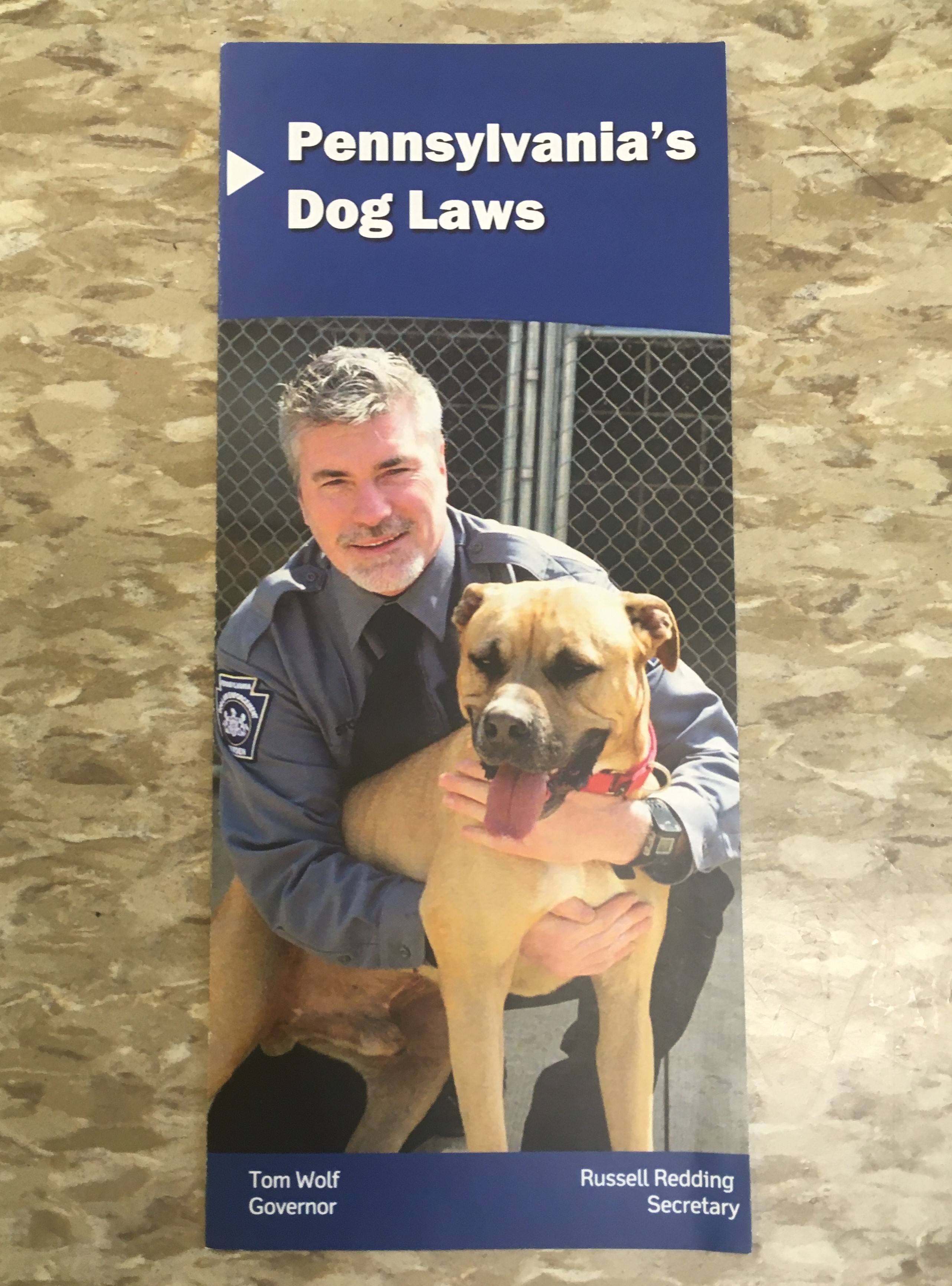
- Enforce licensing and control of dogs.
- Seize and detain any dog seen running at large.
- Investigate dog bites.
- Enforce licensing and control of dogs.
- Enforce kennel licensing and inspections.
- Establish and enforce quarantine of dogs, in certain areas.
- Fund counties and humane organizations to establish dog control facilities.
- Provide educational services concerning dog ownership in Pennsylvania.
- Enforce rabies law.
- Reimburse people for rabies-caused death to livestock.
Responsibilities of the Police in Dog Law Enforcement:
- Assist in the enforcement of the Dog Law, including licensing and control.
- Seize and detain any dog viewed running at large, unaccompanied by the owner.
- Investigate dog bites.
There are Penalties for Violators
- The Department of Agriculture's Bureau of Dog Law Enforcement conducts random checks to determine if rabies vaccinations are current. Authorities investigating complaints about strays, animal bites, and disturbances also check for violations.
- Owners of dogs and house cats 3 months of age that are not vaccinated or have not received a booster shot at the required time can be fined up to $300 in magistrate's court.
- Failure to have a pet vaccinated jeopardizes its life by leaving it vulnerable to exposure to rabid wildlife or domestic animals that may have contracted the disease. If your pet gets rabies, it cannot be saved.
- Unvaccinated pets exposed to positive rabies carriers may be placed under quarantine up to six months in an enclosure to ensure there is no contact with other animals or humans.
- If an unvaccinated pet acquires rabies, it could pass the disease along to you, your family, neighbors, or others through bites or scratches. The treatment to prevent rabies from developing in humans is costly, and once rabies develops it is nearly always fatal.
Pennsylvania's Dangerous Dog Law
Act 46 of 1990 is known as the "Dangerous Dog Law." It was enacted to provide greater protection to persons attacked by a "dangerous dog" and to provide for greater control by owners of dogs considered to be dangerous.
Listed below is a brief description of the provisions of the Dangerous Dog Law.
- A dangerous dog is defined as one which has attacked a human being without provocation, or killed or has inflicted severe injury to a domestic animal without provocation while off an owner's property. Furthermore, a dog is considered dangerous if it killed or has inflicted severe injury to a human being, or if it was involved in committing a crime.
- The act does not apply to police dogs, guide dogs for the blind, hearing dogs for the deaf, aide dogs for the handicapped, or farm dogs(under certain circumstances). The act does not apply where a person attacked, provoked the animal, or was committing willful trespass or another unlawful act for which civil suit can be brought.
- If a dog attacks a person, the person (or anyone acting on his/her behalf), the state dog warden or a police officer may file a complaint with a district justice charging the owner or keeper with harboring a dangerous dog.
- If the dog is deemed dangerous by the district justice, the owner must:
- Register the animal with Bureau of Dog Law enforcement (includes a fee sufficient to cover costs of the program)
- Confine the dog in a proper enclosure
- Post a warning sign with a symbol that warns children of the presence of a dangerous dog
- Keep the dog muzzled and leashed when outside its pen
- Post a bond or purchase and maintain liability insurance in the amount of $50,000 to pay for injuries inflicted by the dog
- Agree not to cancel the liability insurance during the licensed period unless he/she disposes of the dog
- Sign a statement providing that he/she will notify the Bureau of Dog Law Enforcement, state dog warden and local police if the dog is loose, attacks a human or an animal, dies, or is sold/donated.
- In terms of enforcement, a dangerous dog could be confiscated under certain circumstances (i.e., the dog is not properly registered or not kept in a proper enclosure). The owner would be guilty of a criminal offense ranging from a summary offense to a first-degree misdemeanor.
- All known incidents of dog attacks by dangerous dogs must investigate all reports.
- The state Dangerous Dog Law overrides all local ordinances relating to dangerous dogs.
Pennsylvania Department of Agriculture
Bureau of Dog Law Enforcement
2301 North Cameron Street
Harrisburg, PA 17110-9408
717-787-3062
Dog Law Regional Offices:
REGION 1
13410 Dunham Road - Meadville, PA 16335
(Clarion, Crawford, Elk, Erie, Forest, Jefferson, McKean, Mercer, Venango, Warren Counties)
814-332-6890
REGION 2
2130 County Farm Road - Suite 2 - Montoursville, PA 17754
(Cameron, Clinton, Columbia, Lycoming, Montour, Northumberland, Potter, Snyder, Tioga, Union Counties)
717-433-2640
REGION 3
Rt. 92 South - Box C - Tunkannock, PA 18657
(Bradford, Carbon, Lackawanna, Luzerne, Monroe, Pike, Sullivan, Susquehanna, Wayne, Wyoming Counties)
717-836-2181
REGION 4
5349 Wm. Flynn Highway - Gibsonia, PA 15044
Allegheny, Armstrong, Beaver, Butler, Fayette, Greene, Indiana, Lawrence, Washington, Westmoreland counties)
724-443-1585
REGION 5
1304 7th St Cricket Field Plaza - Altoona, PA 16601
(Bedford, Blair, Cambria, Centre, Clearfield, Fulton, Huntingdon, Juniata, Mifflin, Somerset Counties)
814-946-7315
REGION 6
2301 North Cameron St. - Harrisburg, PA 17110
(Adams, Cumberland, Dauphin, Franklin, Lancaster, Lebanon, Perry, York Counties)
717-787-4833
REGION 7
Route 113 - PO Box 300 - Creamery, PA 19430
(Berks, Bucks, Chester, Delaware, Lehigh, Montgomery, Northampton, Philadelphia, Schuylkill Counties)
610-489-1003
Click here to visit the website of the Bureau of Dog Law Enforcement
REPORTING ANIMAL CRUELTY
If you see or witness an act of cruelty against an animal call us at 814-726-1961.
All complaints are held in strict confidence and all callers are anonymous.
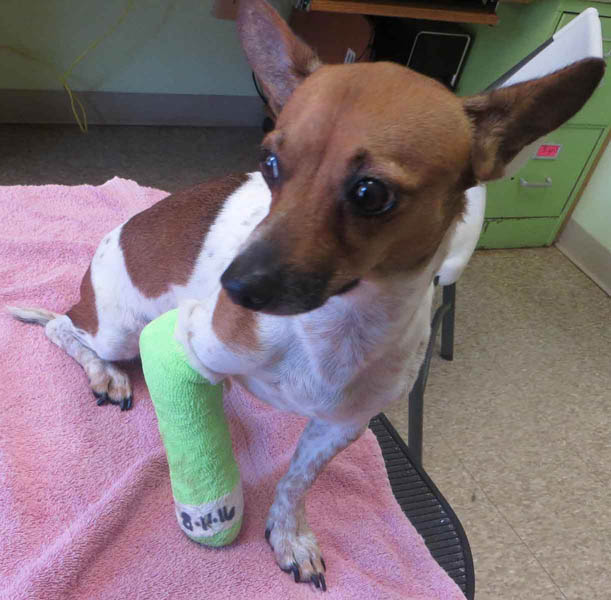 Paws Along The River Humane Society has had a part-time Humane Officer for over 25 years. We work closely with local law enforcement to answer as many calls as possible. Because we are small and not funded for this important work, we do rely on the police agencies to step in and assist.
Paws Along The River Humane Society has had a part-time Humane Officer for over 25 years. We work closely with local law enforcement to answer as many calls as possible. Because we are small and not funded for this important work, we do rely on the police agencies to step in and assist.
Trained by the Pennsylvania Department of Agriculture, Bureau of Dog Law, our part-time officer is sworn in by Warren County Courts and supervised by the District Attorney’s Office. The officer works closely with state and local law enforcement and the court system.
Paws Along The River’s Humane Officer investigates allegations of cruelty to animals and enforces the Commonwealth of Pennsylvania Cruelty Law. This law protects all animals from neglect, abuse, and cruelty treatment, including other acts of cruelty. Through our long history of working with and assisting other entities, we also enjoy strong professional working relationships in the community. The Humane Society Cruelty Investigators enforce the Commonwealth of Pennsylvania Cruelty Law. This body of law governs and protects against the neglect, abusive or cruel treatment of domesticated animals, including farm stock and horses.
Humane Law Enforcement FAQ’s:
-
Q: I called in a cruelty complaint and no one came, why? +
A: Paws Along the River is a non-profit organization that offers a part-time Cruelty Officer as one of its services. Paws addresses as many complaints as possible with one part-time officer. However, the State Police, Township, and City Police can and must enforce all laws in the state of Pennsylvania. If Paws Along the River is not available to take your complaint, we encourage contacting your local law enforcement agency.
-
Q: Why should I bring a stray to Paws? +
A: As an Open Access Shelter, Paws Along the River provides shelter to all animals in need and provides what the laws dictate in our state. Because we are a state-licensed kennel, we are mandated to follow kennel regulations. Dogs are kept at a minimum of 48 hours. After this period, the dogs are quarantined for observation for 10 days before moving forward to evaluate them. This allows time to check for microchips, identification tags, and inquire into veterinary records whenever possible. All animals are provided with food, veterinary care, shelter, and proper attention. To determine adoptability, we do temperament testing. Adoptable pets stay in the shelter until they are adopted. There is no time limit. Be cautious when dealing with feral cats. They can be dangerous. However, we are experienced and able to conduct behavioral testing. Strays can starve; get hit by cars, cause accidents, and hurt people. We are here to protect them and the public.